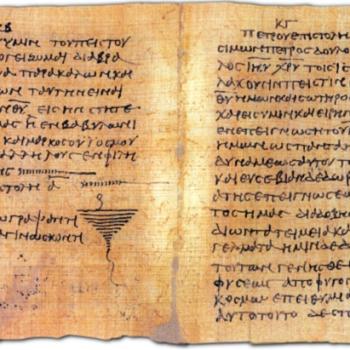When Paul complains that the Galatians “observe days and months and seasons and years,” could he have been thinking of Roman superstitions about the calendar? An interesting idea to play with on the first day of the 2018 calendar!
Obviously, the first thought we jump to when we read Galatians 4:10 is that the new Roman and Greek Christians in central Turkey have been persuaded that they need to observe all the Jewish holy days if they want to be right with God. Faith in the sacrifice of Jesus is not enough, so they were told. Refuting that falsehood is central to what Paul’s whole letter to the Galatians is all about.

But when we take a look at the pre-Christian lives of the Romans and Greeks in Galatia, we find that their lives were even more tightly controlled by another calendar. As J.P.V.D. Balsdon describes it in his profusely-documented book Life and Leisure in Ancient Rome, the Roman calendar was crowded both with days of festivals and games, and with unlucky days to be avoided when carrying out certain activities.
For example, the entrance of the underworld was believed to be open on August 24, October 5, and November 8, dates when the Roman army would avoid going to battle, and the ghosts of the dead were believed to be on the loose on May 9, 11, and 13. Bad days to conduct state business were whenever the Kalends of January or the Nones of any month should fall on one of the market days that fell every eight days. Dates of famous national disasters and military defeats were also considered bad days, including June 21, October 6, and worst of all, July 18, the day that Gaul invaded Rome in 390 BCE, where in Pisa they also remembered the death of Augustus’ adopted son by forbidding all public dinners, parties, entertainment, races, or games.
During the time of Julius Caesar (mid-first century BCE), there were only 243 days available for legal and other public business. But this does not mean that the markets were not open or that everyone stopped work on the other 122 days. Only a few holidays called for giving all workers a day off, such as the Saturnalia in December and the Compitalia shortly thereafter. Holidays that were sacred to Jupiter or Mercury were expanded by the addition of victory and birthday celebrations for emperors.
There were far more details to keep straight than I can capture in this post. And the details on their calendars kept changing as time passed. What a system to be in bondage to! So the Good News of Jesus brings enormous relief to the Galatians who place their faith in him. Paul wants to know: why would these believers want to replace that old system with more days, weeks, seasons, and years to be observed?
“One person judges one day as being better than another, while another person judges all days to be alike.” (Romans 14:5) At this time in my life, I am inclined more than ever toward treating all days alike. We have little control over whether a day when we plan to celebrate will turn out to be a good or bad day to do so. December 25 may turn out to be a terrible day (it can be bad timing for those who have suffered tragedies in this season), but I can celebrate the birth of Jesus any day. Good Friday is a compelling day to remember what happened on that all-important day on the cross, but there are other days we can and should do so, and we need not condemn ourselves if we fail to do so on that calendar date. (That date moves around, by the way, so is it more meritorious to remember that day by where it falls on a lunar reckoning, or should we go with April 7 or April 3, depending on which year we date the all-important event, another detail which God did not give us in Scripture?)
The day after tomorrow will be forty years since the day my wife and I got engaged, but that date may not be the best day to celebrate, nor need I wait until then to do my celebrating. Why be controlled by dates on a calendar? It’s wonderful when such dates work out, but no reason for it to ruin anyone’s day if they don’t.
We have some hilarious dates coming up in 2018: Easter Sunday is on April 1 (are you an April Fool if you believe that Jesus rose?), and Ash Wednesday is on Valentine’s Day! What will that do to chocolates and romantic dinners? Nothing, if we do not limit ourselves as to which days we pursue repentance and self-examination, or which day we choose to celebrate romantic love. Let the calendar inform us, but not control us.














